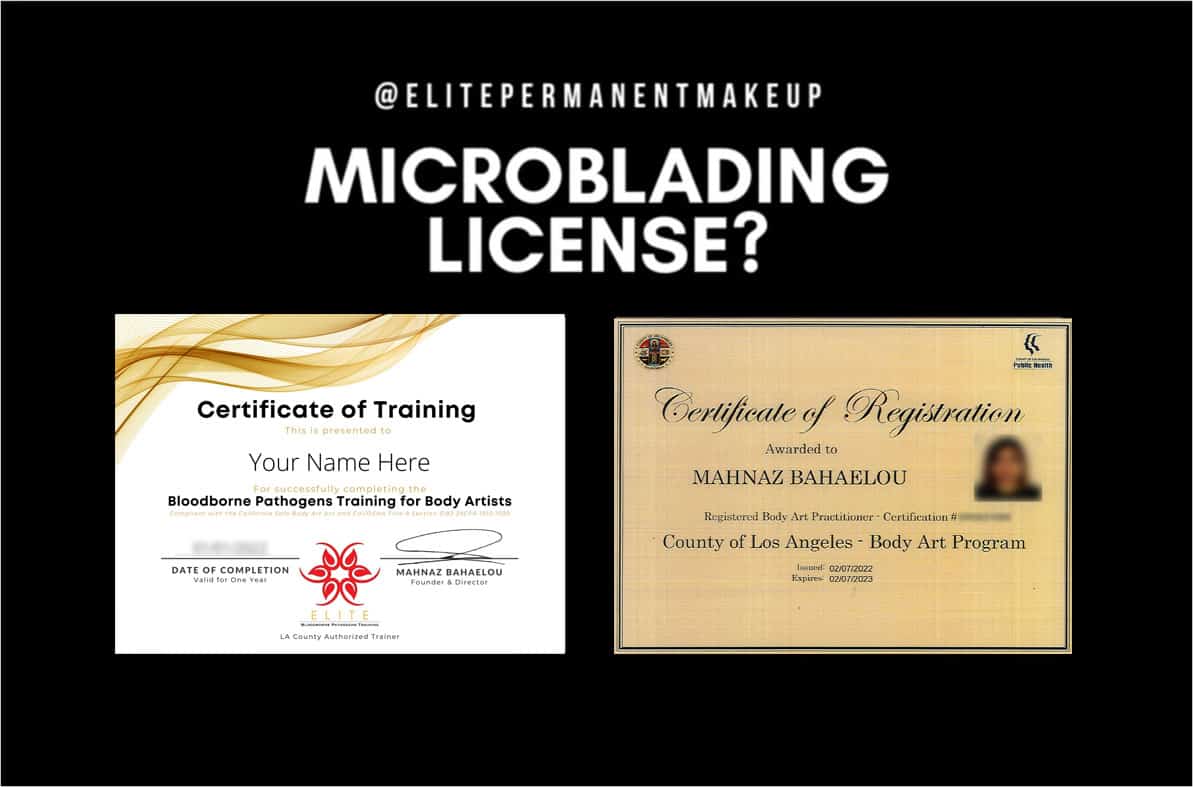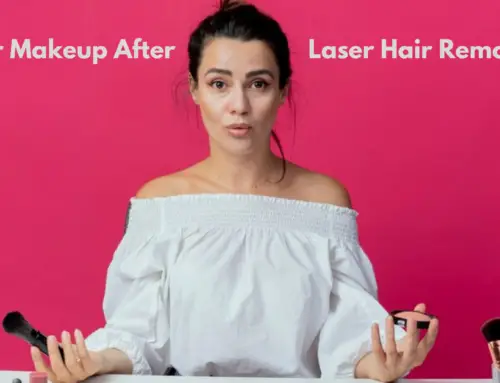When it comes to permanent makeup, did you know that obtaining the necessary license is crucial? The art of enhancing one’s features through tattooing requires specific training and expertise, ensuring the safety and quality of the procedure. Without the proper license, practitioners risk potential complications and legal consequences.
Obtaining a license for permanent makeup involves a combination of education, training, and certification. Aspiring artists must complete a state-approved program that covers topics such as infection control, anatomy, color theory, and proper sterilization techniques. Additionally, they must pass written and practical exams to demonstrate their knowledge and skills. This process ensures that licensed professionals are well-equipped to provide safe and effective permanent makeup services to their clients.
Obtaining the necessary license for permanent makeup requires professional training and certification. To perform permanent makeup procedures, you will typically need to complete a cosmetology or esthetician program, depending on your state’s requirements. Additionally, some states require a separate tattoo artist license. It’s important to research and understand the specific licensing regulations in your state to ensure compliance. Contact your local cosmetology board or health department for detailed information on the licensing process.

Understanding the Licensing Requirements for Permanent Makeup
Permanent makeup, also known as micropigmentation, is a popular cosmetic procedure that involves tattooing pigment into the skin to enhance the appearance of eyebrows, eyelids, and lips. If you’re considering becoming a permanent makeup artist or opening a permanent makeup studio, it’s important to understand the licensing requirements to ensure that you operate legally and safely. This article will guide you through the process of obtaining the necessary license for permanent makeup.
Before delving into the specific license requirements, it’s essential to note that licensing regulations vary from country to country and even from state to state within a country. Therefore, it’s crucial to consult the local regulatory authority or health department in your area to get accurate and up-to-date information on the requirements for your location.
That being said, here are some general guidelines and information that can help you understand the necessary license requirements for permanent makeup.
1. Research Local Regulations
The first step in obtaining a license for permanent makeup is to research the local regulations in your area. This includes understanding the specific requirements set by the local regulatory authority or health department. These requirements may include minimum training hours, educational qualifications, and certification from recognized organizations or schools.
Make sure to thoroughly review the licensing requirements, as there may be additional rules and regulations related to the practice of permanent makeup, such as health and safety guidelines, sanitation protocols, and record-keeping requirements. Understanding these regulations will help you prepare for the licensing process.
Additionally, researching local regulations will also give you insights into any restrictions or limitations on the practice of permanent makeup, such as age restrictions, prohibited areas, or specific practices that require additional licensing or certification.
2. Complete the Required Training
Most jurisdictions require individuals practicing permanent makeup to complete a certain number of training hours or courses before they can obtain a license. These training programs are designed to provide aspiring permanent makeup artists with the necessary knowledge and skills to perform the procedure safely and effectively.
During the training, you will learn about topics such as color theory, facial anatomy, hygiene and sanitation, client interaction, and the different techniques and tools used in permanent makeup. It’s essential to choose a reputable training program from a recognized organization or school to ensure that your training meets the requirements set by the local regulatory authority.
After completing the required training, you may need to provide evidence of your certification or completion of the program when applying for the license.
3. Submit the License Application
Once you have fulfilled the training requirements, the next step is to submit the license application to the appropriate regulatory authority or health department.
The application process typically involves completing an application form, paying the required fees, and submitting any supporting documents, such as proof of training, certifications, and identification. It’s important to carefully follow the instructions provided by the licensing authority and ensure that all the required information is included in the application.
Depending on the jurisdiction, there may be additional steps involved in the application process, such as background checks, interviews, or practical examinations. Make sure to be prepared for any additional requirements and provide all the requested information promptly.
4. Maintain Continuing Education
After obtaining the license for permanent makeup, it’s important to stay updated with the latest trends, techniques, and regulations in the field. Many jurisdictions require licensed professionals to undergo continuing education to maintain their license.
Continuing education can include attending workshops, seminars, conferences, or online courses that focus on advanced techniques, safety protocols, and industry standards. By staying current with your knowledge and skills, you can provide the best possible service to your clients and ensure that you are complying with the ongoing requirements for maintaining your license.
5. Renew Your License Periodically
Licenses for permanent makeup are typically valid for a specific period. It’s important to keep track of the expiration date and renew your license before it expires to continue practicing legally.
The renewal process may require you to provide updated information, pay renewal fees, and demonstrate compliance with any continuing education or other requirements specified by the regulatory authority. Failure to renew your license on time can result in penalties or the suspension of your practice.
6. Adhere to Health and Safety Regulations
Beyond the licensing requirements, it’s crucial for permanent makeup artists to adhere to health and safety regulations to protect the wellbeing of their clients. This includes maintaining a clean and sterile environment, sterilizing equipment, using single-use needles, and following proper sanitation procedures.
Additionally, it’s essential to prioritize client safety by conducting thorough consultations, patch tests for allergies, and providing aftercare instructions. By following best practices and ensuring high standards of hygiene, you can build trust with your clients and establish a reputable and successful permanent makeup practice.
Conclusion
Obtaining the necessary license for permanent makeup is a crucial step in becoming a professional and legal practitioner in the field. By understanding and fulfilling the specific licensing requirements in your area, completing the required training, and adhering to health and safety regulations, you can establish a successful career in the world of permanent makeup.
Key Takeaways: What License Do I Need for Permanent Makeup
- Before practicing permanent makeup, it is important to obtain the necessary license.
- The specific license requirements vary by state and country, so research your local regulations.
- Many states require a cosmetology or esthetics license for permanent makeup artists.
- Some states have separate licenses specifically for permanent makeup technicians.
- Completing a training program and passing an exam may be necessary to obtain your license.
Frequently Asked Questions
Here are some common questions related to obtaining a license for permanent makeup:
1. How do I obtain a license for permanent makeup?
To obtain a license for permanent makeup, you need to follow these steps:
Firstly, research the specific requirements in your state or country, as they can vary. Generally, you will need to complete a training program or course approved by the health department or regulatory body. This training will cover topics such as safety protocols, hygiene practices, and proper use of equipment.
After completing the training, you may need to pass a written exam and/or submit proof of a certain number of hours of practical experience. Once you meet the requirements, you can apply for a license through the appropriate licensing agency or department.
2. Is a license required for all types of permanent makeup procedures?
In most states or countries, a license is required for all types of permanent makeup procedures. This includes procedures such as eyebrow microblading, lip tattooing, and eyeliner tattooing.
Since permanent makeup involves the use of needles and pigments that penetrate the skin, it is considered a form of tattooing. Therefore, it is regulated to ensure the safety and competence of practitioners.
3. Can I practice permanent makeup without a license?
No, practicing permanent makeup without a license is illegal in most jurisdictions. It is important to comply with the licensing requirements set by your state or country’s health department or regulatory body.
Operating without a license not only puts you at risk of legal consequences but also endangers the health and safety of your clients. Obtaining a license ensures that you have received proper training and are capable of providing safe and hygienic permanent makeup procedures.
4. How long does it take to get a license for permanent makeup?
The time it takes to get a license for permanent makeup varies depending on the individual and the specific requirements of your state or country. Generally, it can take several weeks to several months.
This time includes completing the required training program, gathering any necessary documentation, and submitting your application. It is important to plan ahead and allow yourself enough time to meet the requirements and go through the application process.
5. Are there any ongoing requirements after obtaining a license for permanent makeup?
Yes, there are usually ongoing requirements after obtaining a license for permanent makeup. These requirements may include:
– Renewing your license periodically, which could be annually or every few years depending on your jurisdiction.
– Completing continuing education credits to stay updated on the latest techniques, safety protocols, and industry standards.
In order to practice permanent makeup, you need to obtain the appropriate license. This ensures that you have the necessary training and qualifications to perform this cosmetic procedure.
The specific license required may vary depending on your location, but generally, you will need a cosmetology or esthetics license. It’s important to research and comply with the regulations set by your state or country to ensure you are conducting this practice legally and safely.






Leave A Comment